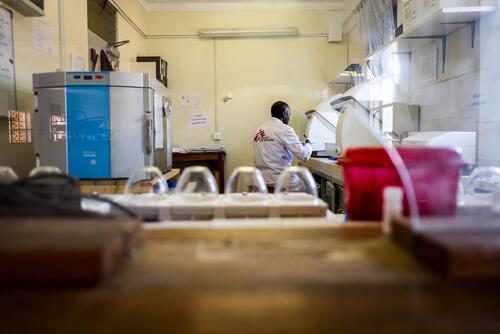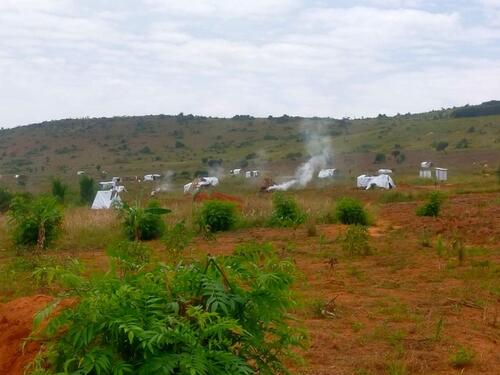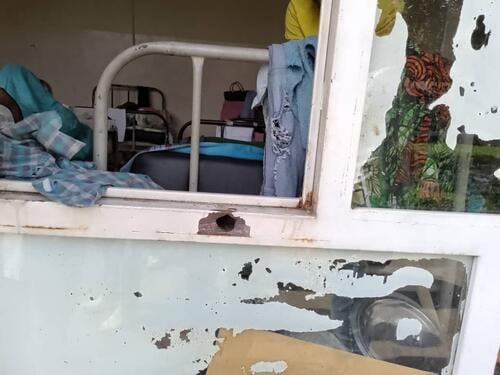For over 20 years, Médecins Sans Frontières (MSF) has supported the Ministry of Health with treatment for people living with HIV/AIDS in the West Nile region of Uganda and more specifically, in the Arua district.
Together, MSF and the District Health Services have been constantly reviewing the strategy to care for the most vulnerable people, and helping to introduce various innovations in disease management, such as antiretroviral (ARV) treatment, specific care for children and adolescents, peer support groups and point-of-care laboratory analysis.
As the overall improvement of living conditions for people living with HIV in Arua has been achieved, our teams are fully withdrawing from the programme, handing activities over to the Ugandan health authorities and their partners.
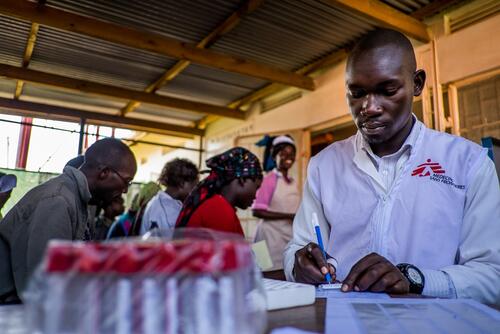
A brief history
In 1999, our teams started supporting local health authorities and the hospital management team of Arua Regional Referral Hospital, in the northwest of Uganda, to prevent mother-to-child HIV transmission.
Three years later, we established one of the first ARV treatment programmes in the country, initiating ARV treatment for all HIV-positive patients in need in Arua District.
At the time, there was no free-of-charge treatment accessible for those who received a positive HIV-diagnosis, making medicines unaffordable for most people. Coupled with widespread lack of knowledge and misconceptions about the disease, this resulted in a high level of stigma and exclusion from communities for people living with HIV. Being diagnosed with HIV was often equivalent to announcing a near and certain death.
In 1990, when I was diagnosed, the stigma was too great. There was no medicine for the virus, it was only death.Helen Candiru, a 64-year-old former MSF patient living with HIV.
“In 1990, when I was diagnosed, the stigma was too great. There was no medicine for the virus, it is only death,” says Helen Candiru, a 64-year-old former MSF patient who has been living with HIV for 33 years.
The introduction of free ARV treatment in the region of Arua was a game-changer for patient’s living with HIV.
“At that time, the Ministry of Health didn’t really having any ARV treatment. And the only service was from MSF,” says Wadri Fennahas, a former HIV patient who is now 65 years old.
To complement the medical assistance provided through diagnosis, treatment and follow-up, we soon accompanied our medical care with extensive psychosocial support, including peer counselling, as well as outreach and home visits to support patients and inform family members about the disease and the need for their continuous support.
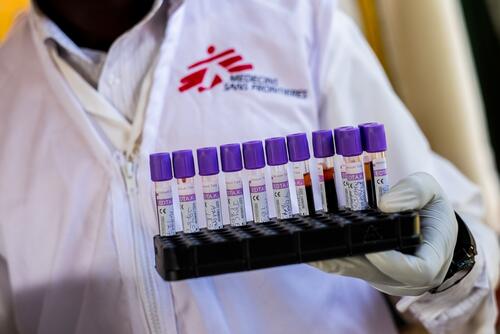
Decentralisation of HIV care
It was only in 2004 that ARV treatment became free through the health authorities, however, there was still limited access and recurrent stock-outs.
From 2005 to 2010, we promoted the decentralisation of HIV care in four sites, in collaboration with the District Health Services: Koboko, Adjumani, Nebbi and Yumbe. Our teams also supported the health authorities through the training and mentoring of staff.
At the time in Uganda, only doctors were able to prescribe ARV treatment in large hospitals. The objective was to enable smaller health centres, closer to patients’ homes, to provide treatment and management of HIV.
As ARV treatment became more accessible in the country, and diagnostic and treatment facilities developed, we gradually transferred patients to their closest peripheral health centre and focused our support on the most critical patients.
This included those suffering from second-line treatment drug failure in need of an expensive genotyping test and eventually in need of a third-line treatment not yet available in Uganda.
HIV care for children and adolescents
We also continued caring for children and adolescents, and patients with advanced HIV diseases. Fred Econi, MSF medical team leader in Arua and member of the medical team since 2006, remembers the creation of the first MSF groups dedicated to children.
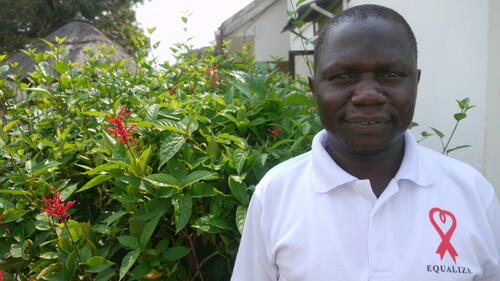
The creation and implementation of a specific approach for children and adolescents, first with Safe Haven and then in collaboration with Maisha – an organisation created by former young patients from Safe Haven who became adults – enabled better adherence to treatment.
Teenage patients were invited on Saturdays to attend a day of activities including football, games, free food and health education with peer counsellors.
“That is when I started knowing that we are not alone. We have a group of people who are like us,” says Jordan Opileni, one of the founders of Maisha. “Hope started coming in slowly. Mostly it has helped in dealing with acceptance, which is the toughest thing someone HIV-positive faces every day.
“Without acceptance, you will not see the use of medication: without the use of medication, you will not see the use of life,” he says.
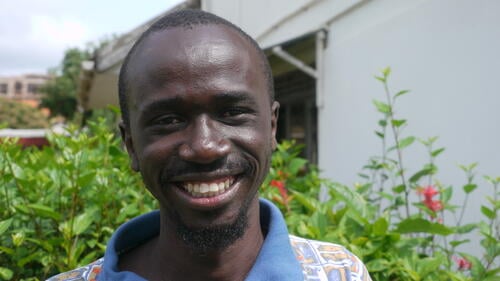
More than 20 years after our initial support to people living with HIV in Arua, huge progress has been made. Increased knowledge and better clinical management, along with better acceptance both from patients and the community has enabled significant progress towards the UNAIDS 95-95-95 strategy2025 HIV/AIDS targets of UNAIDS. That means 95 per cent of people who are living with HIV know their HIV status, 95 per cent of people who know that they are living with HIV are on lifesaving antiretroviral treatment, and 95 per cent of people who are on treatment are virally suppressed..
According to the latest Uganda population-based HIV impact assessment in 2020-2021, 80.9 per cent of Ugandan people know their HIV status, 96.1 per cent of whom are on ARV treatment, and 92.2 per cent of whom have had their viral load suppressed. At this stage, the patient’s immune system is strengthened, and the risk of transmitting HIV infection is considerably reduced.
More people are now living with HIV in the country. Last year, as many as 1.4 million people were living with HIV, compared to just 530,000 in 2003, according to UNAIDS. This is explained through more awareness, more testing and lower mortality from the disease: 14,000 people died from HIV/AIDS in 2022 compared to 78,000 in 2003.
Over the years, our teams, in collaboration with the Ministry of Health, have brought innovations in models of care to Arua district, which are now part of the general national strategy for diagnosis and treatment for people living with HIV in the country.
Although we are ending our support to the HIV programme in Arua, we remain present in Uganda to respond to emergencies, while our teams continue to work in the district of Kasese, where we run a specialised centre for adolescents aged between 10 to 19 years old. This project enables adolescents to benefit from medical care adapted to their specific needs, especially in terms of sexual and reproductive health, with a particular focus on pregnant adolescents, HIV treatment and care, sickle cell anemia, social support and mental health.



